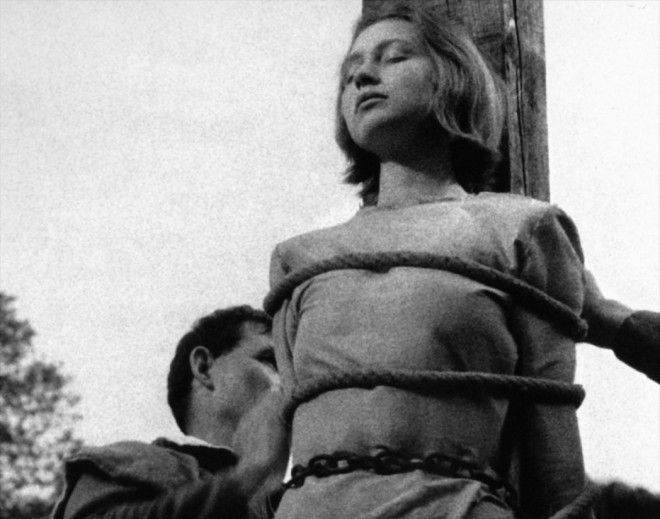Film Review: Proces de Jeanne D’Arc by Tejvan
“…they do not order me to disobey the Church, but God must be served first.” – Joan d’Arc at her trial.
Directed by Robert Bresson the trial of Joan of Arc is a fascinating perspective of the show trial of, Joanne d’Arc, the patron saint of France. The striking feature of the film is its simplicity. There is nothing staged for dramatic or emotional effect. Bresson adds nothing to complicate or distract from the essence of this extraordinary trial. Bresson leaves it to the power of the words and the austere setting to create a thought provoking and very realistic account of this fascinating trial. The simplicity and power of the film comes from Robert Bresson’s decision to remain as faithful as possible to the exact transcript of the trial. By good fortune, all of Jeanne’s questions and answers were written down. From these extracts, and her later rehabilitation trial 25 years after her death, Bresson is able to deliver a realistic and compelling insight into the final moments and inner thoughts of Jeanne d’Arc. As with many of his other films, Robert Bresson chose not to use professional actors. He believed that real actors often hide behind their stage personae. When watching a great actor, he feels that, sometimes we struggle to separate the actor from the character. Bresson felt by using non professional actors it would help them to get at the heart of the character, unencumbered by previous roles. In this film, Florence Delay, who provides a performance of great dignity and intensity, played the lead character of Jeanne D’arc. Florence manages to capture Jeanne’s quixotic mix of gentleness, spirituality and, on occasions, a forceful insolence to the questioning of her interrogators. The performance gives a revealing insight into the intrepid, and resolute character of Jeanne. Yet despite her bravery and courage, the trial was obviously a severely testing time; she has no counsel or sympathisers. The simple black and white shots of her room, chains and interrogators give an unsentimental portrayal of her darkest hours. For example, in one scene, we see a brick thrown through her window. In a sense of desperation Jeanne replies: “Where are my people? Why have they deserted me?”
(Jeanne was betrayed by King Charles II, who she helped gain the throne. He never attempted to rescue her. ) Throughout the film we get a glimpse into the life of a Saint, but with the very real human qualities of fear and desperation; it is a powerful combination. The drama of the film comes from the intense battle of wits between Bishop Cauchon and Jeanne d’arc. Jeanne speaks on her mystical experiences with neither hesitation nor fear. It expresses a remarkable confidence and sincerity. “I believed it at once, and I had the will to believe it. When Saint Michael came to me, he said to me: ‘Saint Catherine and Saint Margaret will come to thee; follow their counsel; they have been chosen to guide thee and counsel thee in all that you have to do: believe what they shall tell thee, it is the order of Our Lord.’ ”
At other times we see her sincere pride in her leadership and mission: “Which did you care for most, your banner or your sword?” (interrogators) “Better, forty times better, my banner than my sword!” (Jeanne d’Arc)
We see Jeanne portrayed not as a romanticised Saint, but as a real person, aware of a very specific mission, but on the other hand aware she also displays a genuine humility. “I do not know if it be the Will of God. Without the grace of God I should not know how to do anything.” (Jeanne)
It is also worth briefly mentioning the role of Bishop Chaucon whom Jeanne D’Arc refers to as my chief enemy) In previous films, he is portrayed in a very unflattering light; this film shows him in a more sympathetic light. Whilst not excusing his actions, we do get to understand his mindset which lead him to such a course of action. It seems Bishop Chaucon sincerely felt he had a divine duty to save the immortal Soul of Jeanne d’Arc. Throughout the film the powerful academics and church hierarchy endeavour to make Jeanne d’Arc submit to the will of the Church. Many times they ask her, “Will you submit to the authority of the Church.?
The answer of Joan, which sticks vividly in the memory. “they do not order me to disobey the Church, but God must be served first.”
Under intense pressure, by the stake, after weeks of solitude and being deprived of any material or spiritual comfort, Jeanne did retract her actions, signing a confession. But this relapse did prove temporary, and after 1 night, she retracted her previous confession and was burned at the stake. It is testament to her extraordinary capacity to inspire others that 500 years after her death, the life of Joan d’Arc has created and ever growing compilation of studies, films and novels. This film gives one of the most penetrating insights into her actual character. We feel it is a realistic portrayal of her final moments, unspoilt by the imagination of the directors and artists.
Transcripts from the Trial of Joan d’Arc Proces de Jeanne d’Arc at IMDB Female Saints Biography Jeanne D’Arc



